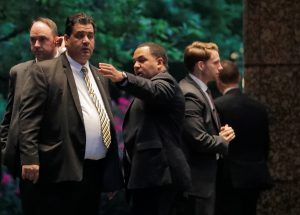By Rodrigo Campos and Daniel Bases
NEW YORK (Reuters) – U.S. Secretary of State Mike Pompeo and high-ranking North Korean official Kim Yong Chol enter a second day of meetings in New York on Thursday as they try to settle nuclear weapons disagreements and set the stage for an historic summit between their leaders.
The two men left a 90-minute private dinner at a New York apartment on Wednesday night without providing details about their conversation. Another round of talks is due on Thursday.

A Secret Service agent gestures outside of entrance where North Korean envoy Kim Yong Chol and U.S. Secretary of State Mike Pompeo are meeting in New York, U.S., May 30, 2018. REUTERS/Lucas Jackson
The United States has been demanding that North Korea abandon its nuclear weapons program amid reports that it is close to being able to launch a nuclear-tipped missile capable of reaching the United States.
Pyongyang has long argued that it needed nuclear weapons for its security.
There were reports earlier on Wednesday that South Korean officials were noting “quite significant” differences between the United States and North Korea over denuclearization.
The New York meetings follow high-level conversations Pompeo held in North Korea in April and earlier in May and are intended to get negotiations between the two long-time adversaries back on track.
U.S. President Donald Trump and North Korean leader Kim Jung Un had been scheduled to hold an unprecedented summit in Singapore on June 12. Disputes between Washington and Pyongyang led Trump to cancel the meeting, only to see a renewal of diplomatic efforts in recent days.
“The potential summit …. presents DPRK with a great opportunity to achieve security and economic prosperity,” Pompeo said on Twitter on Thursday, referring to North Korea by the initials of its official name, the Democratic People’s Republic of Korea.
“The people of North Korea can have a brighter future and the world can be more peaceful,” he said.
Kim Yong Chol, a close aide of Kim Jong Un and vice chairman of the ruling Workers’ Party’s Central Committee, is the most senior North Korean official to meet top U.S. officials for talks in the United States in nearly two decades.
In Pyongyang, Kim Jong Un welcomed visiting Russian Foreign Minister Sergei Lavrov in the first meeting between a Russian official and Kim as head of state.
Lavrov invited Kim to Russia, and called for a phased approach to denuclearization, including easing of international sanctions on North Korea.
CLEAR INTENTIONS?
The United States, in return for North Korea giving up its nuclear weapons, could potentially loosen sanctions, leading to possible food and other aid to impoverished North Korea and improved ties with South Korea.
A senior U.S. State Department official briefed reporters separately as Pompeo and Kim Yong Chol met late on Wednesday. The official, who asked not to be identified, said North Korea is “going to have to make clear what they are willing to do” in response to Washington’s demands.
Trump, the official said, “can make a fly or no-fly decision anytime he wants,” referring to the possible Singapore summit.
If not enough progress is made to lead to a productive meeting between Trump and Kim Jung Un, the official said, “we will ramp up the pressure on them and we’ll be ready for the day that hopefully they are ready.”
The two Koreas have technically been at war for decades, even though the Korean War’s military combat ended in 1953, because a peace agreement was never signed.
China, North Korea’s main trading partner and a key ally, said it supported and encouraged the “emerging good faith” between the United States and North Korea.
“At the same time as working to achieve the goal of denuclearization, we should also build long-term and effective initiatives to keep peace on the Korean peninsula,” China’s foreign ministry Hua Chunying said in Beijing.
Russia has appeared to be on the fringes of a flurry of diplomacy, but Lavrov’s visit was a move to raise its profile in international efforts to ease tension on the Korean peninsula, said Artyom Lukin, a professor at Far Eastern Federal University in Vladivostok.
“Moscow wants to be in the loop concerning the latest developments, especially with respect to the likely summit between Trump and Kim Jong Un,” Lukin said.
“For its part, North Korea would like to have Russian support entering high-stakes negotiations with Washington.”
(Reporting By Rodrigo Campos and Daniel Bases in New York; Susan Heavey and Richard Cowan in Washington; Additional reporting by Christian Shepherd in Beijing, and Josh Smith in Seoul.; Editing by Paul Tait, Robert Birsel)
 North Korean envoy Kim Yong Chol arrives at a hotel in New York, U.S., May 30, 2018. REUTERS/Lucas Jackson
North Korean envoy Kim Yong Chol arrives at a hotel in New York, U.S., May 30, 2018. REUTERS/Lucas Jackson
